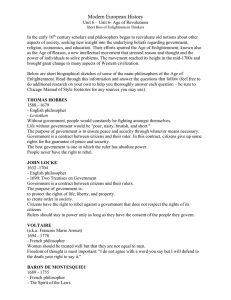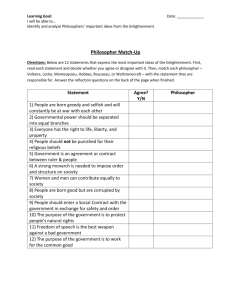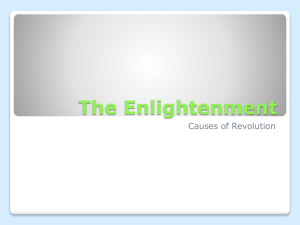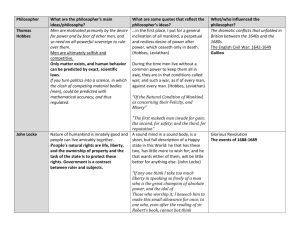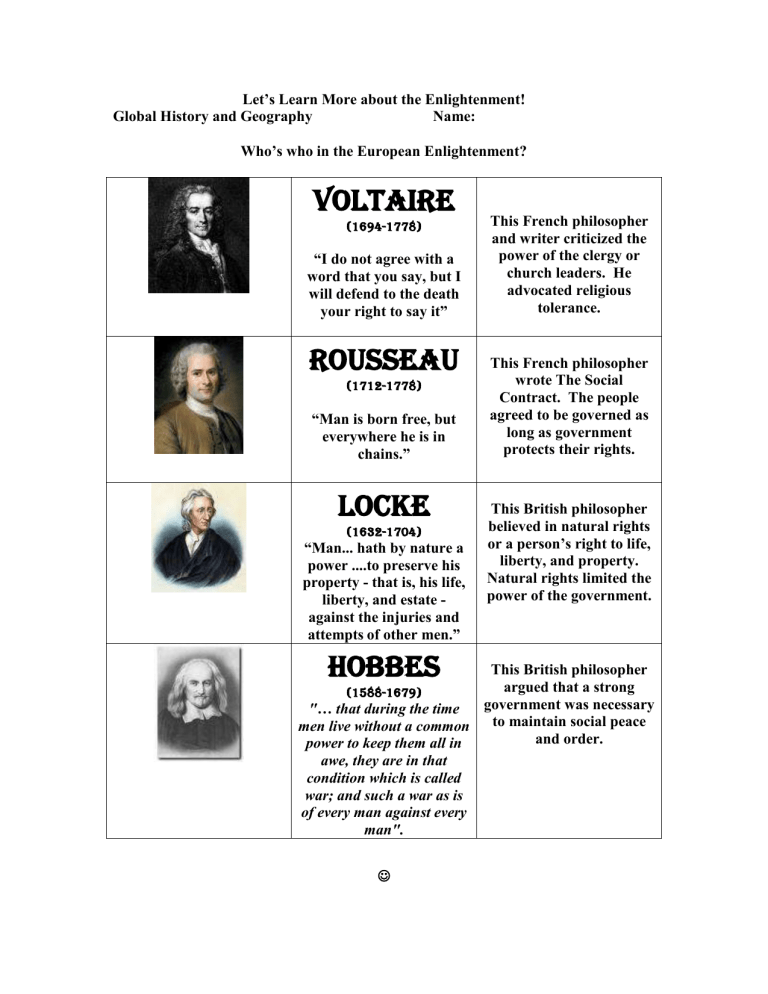
Let’s Learn More about the Enlightenment! Global History and Geography Name: Who’s who in the European Enlightenment? Voltaire (1694-1778) “I do not agree with a word that you say, but I will defend to the death your right to say it” Rousseau (1712-1778) “Man is born free, but everywhere he is in chains.” Locke (1632-1704) “Man... hath by nature a power ....to preserve his property - that is, his life, liberty, and estate against the injuries and attempts of other men.” Hobbes This French philosopher and writer criticized the power of the clergy or church leaders. He advocated religious tolerance. This French philosopher wrote The Social Contract. The people agreed to be governed as long as government protects their rights. This British philosopher believed in natural rights or a person’s right to life, liberty, and property. Natural rights limited the power of the government. This British philosopher argued that a strong (1588-1679) government was necessary "… that during the time to maintain social peace men live without a common and order. power to keep them all in awe, they are in that condition which is called war; and such a war as is of every man against every man". Questions: 1. Who was Voltaire and what did he believe? __________________________________________________________________ __________________________________________________________________ __________________________________________________________________ 2. What belief did Rousseau and Locke share? __________________________________________________________________ __________________________________________________________________ __________________________________________________________________ 3. Why did Hobbes believe a strong government was necessary? __________________________________________________________________ __________________________________________________________________ __________________________________________________________________ 4. Explain Voltaire’s quote: __________________________________________________________________ __________________________________________________________________ __________________________________________________________________ 5. Which philosopher do you agree with? Explain your answer. __________________________________________________________________ __________________________________________________________________ __________________________________________________________________ Multiple-Choice Questions: 1. Which heading best completes the partial outline below? I. ______________________ A. Writings of Thomas Hobbes B. Divine right theory C. Centralization of political power D. Reign of Louis XIV (1) Beginning of Global Trade (2) Growth of Democracy in Europe (3) Rise of Absolutism (4) Age of Exploration One way in which Montesquieu, Voltaire, and Rousseau are similar is that they were (1) philosophers during the Age of Enlightenment (2) chief ministers during the French Revolution (3) leaders of the Italian unification movement (4) supporters of the Counter Reformation In Two Treatises of Government, John Locke wrote that the purpose of government was to (1) keep kings in power (2) regulate the economy (3) expand territory (4) protect natural rights Questions: 1: What is a New Year’s Resolution? ________________________________________________________________________ ________________________________________________________________________ ________________________________________________________________________ 2: Why did Calvin not make any New Year’s resolutions? ________________________________________________________________________ ________________________________________________________________________ ________________________________________________________________________ 3: How are Calvin’s beliefs similar to Voltaire’s? ________________________________________________________________________ ________________________________________________________________________ ________________________________________________________________________ 4: Is Hobbes right? Can too much tolerance be a problem? ________________________________________________________________________ ________________________________________________________________________ ________________________________________________________________________ 5: But seriously, why is toleration important? ________________________________________________________________________ ________________________________________________________________________ Word Bank: Experimentation, Philosophe, Humanism, Renaissance, Arts, Greeks, Voltaire, Hobbes, Locke, Rousseau, Confucius, Secularism, Enlightenment, Scientific “The first man who, having enclosed a piece of ground, bethought himself of saying (said) ‘This is mine,’ and found people simple enough to believe him, was the real founder of civil society. Humanity would have been spared (saved) infinite crimes, wars, homicides, murders, if only someone had ripped up the fences or filled in the ditches and said, "Do not listen to this pretender! You are eternally lost if you do not remember that the fruits of the earth are everyone's property and that the land is no-one's property!" But by that point things had changed so drastically that there was no turning back, for this idea of "property," which develops out of prior ideas, did not form spontaneously in the human mind. Men had to progress, acquiring knowledge and arts, transmitting and increasing these from generation to generation, before they reached the last stage in the natural human state. I shall endeavor, then, to explain the progress of events and discoveries from the perspective of their natural order.” ~ Rousseau Questions: 1. What did the “first man” do? _______________________________________________________________ _______________________________________________________________ 2. Why would there be no crime, war, homicide, or murder if the “first man” had not done this? _______________________________________________________________ _______________________________________________________________ 3. What should the people have said to the “first man”? _______________________________________________________________ _______________________________________________________________ And so, rules and government were born. But what kind of government is best for society? Which rules make the most sense for society? Ah, now, you are thinking like an Enlightenment thinker. So, it’s your turn: What type of political system or government do you believe is best for society? _________________________________________________________________ List three essential or necessary rules for society: 1. ______________________________________________________ 2. ______________________________________________________ 3. ______________________________________________________ Rene Descartes “If you would be a real seeker after truth, it is necessary that at least once in your life you doubt, as far as possible, all things.” Questions: 1: What did Descartes believe was necessary in order for a person to become a real seeker of truth? ________________________________________________________________________ ________________________________________________________________________ 2: Do you agree with Descartes? Explain your answer. ________________________________________________________________________ ________________________________________________________________________ But remember the Scientific Method. How could the Scientific Method help a philosopher solve a societal problem? Now, you try? 1. State a Problem in Society: ________________________________________________________________ 2. Make Observations: _________________________________________________________________ 3. Form a Hypothesis: __________________________________________________________________ 4. Experiment: __________________________________________________________________ 5. Conclusion: _______________________________________________________

